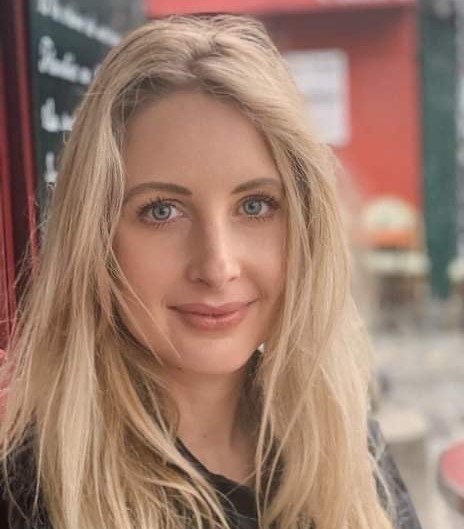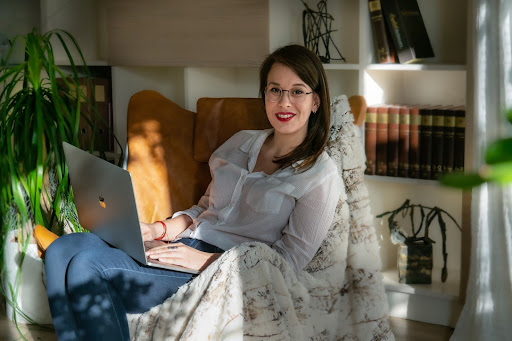Meet our mental health counsellor: Marique Van Heerden

Karolina, welcome and happy to have you for our interview. Can you tell us a bit about yourself?
Hi, thanks for having me! I’m originally from Brno, the second biggest city in Czechia, but I lived in the UK for almost a decade. I moved to England to study psychology and decided to stay after graduation to work for the NHS (National Health Service). It was a tough job, but I had the opportunity to gain experience from many fields, such as chronic pain management, weight management, addiction and recovery from psychiatric conditions.
At one point I felt that my life in the UK came to an end and decided to leave. I quit my job, sold everything and left for Nepal and India where I studied yoga and meditation. Due to COVID-19 I eventually landed back in Czechia. It was a rocky road, but I really enjoy settling down in Prague, which, for me, is a great place to live.
As a psychologist now, can you tell me what the main motivation was for you to study psychology back in the days?
Thinking about people, and what makes them tick, comes naturally to me. I also firmly believe that everyone can break free from past experiences and unhelpful patterns that are holding them back in life. In the past, I was very fortunate to receive support to help me get through difficult life moments. Now, I am able to return this gift and be a guide to others.
Can you tell us a bit more about your position as a mental health counsellor-psychologist in Prague Integration? What are your main responsibilities?
I provide individual counselling for expats living in Czechia, both face-to-face and online.
Usually, I meet clients on a weekly basis. What we do in the sessions is guided by the client’s wishes. Whatever the client brings, it is my job to help them unpick the problem and find the best way forward. We might work on developing coping skills such as mindfulness or breathing exercises to manage anxiety; or we might focus on increasing client’s self-compassion to help them process past events. I have a whole range of techniques up my sleeve to help someone get unstuck in a way that is appropriate for them.
What part of your job do you enjoy the most?
I love to see the progress people make once they commit themselves to ‘do the work’. It is so rewarding to witness how things that used to be scary and painful, are no longer an issue. The greatest challenges in life, bring along the greatest opportunities to grow.

Is there any specific mental health field you are interested in? If yes, can you tell us more about it?
I am fascinated by the connection between physical and mental health. Latest research informs us about how it all works, for example how decreasing stress shortens time to heal from an injury. Likewise, our body offers an amazing opportunity to support our mental health. When we experience difficult situations, we might get disconnected from our body and the way our emotions manifest. Because of this, the emotion can get ‘stuck’ and keep us in a loop of negative feeling. The techniques to help us reconnect with our body are easy to learn, anyone can practice them and they are very effective.
Can you tell us more about the main areas of concern that clients who come to you look for help with?
Some clients want to improve their skills in managing day to day mental health, anxiety and depression. Others want to process things that happened in the past. Some clients might not exactly know what they want from counselling, they ‘just’ want to feel better. I think the COVID – 19 situation has been very straining for many people and we see an increase in mental health issues worldwide. The flip side is that, because so many people are facing their difficult feelings it has become more normal to seek professional support.
Are there any specific issues that foreigners-expats tend to deal with in the Czech Republic?
Czechia is my home country but having lived abroad for so long, I sometimes feel like an expat myself. Culture is an evolving thing and it creates ground for common understanding, things like humour, trends or customs. When we move abroad we plant ourselves in a different culture and have to work hard to understand what’s going on around us. Anyhow, living abroad can bring a lot of uncertainty around our right to remain, work and make plans for the future, beyond what the nationals face. Czech language is a very difficult one and not being able to speak it can feel quite isolating.
From your point of view, what are the 3 main benefits of individual counselling?
- Individual counselling helps you see your situation from a different perspective – a good talk with friends is helpful, but a counsellor is specifically trained to help you discover what is right for you.
- You will learn and develop skills to help you manage your mental health long-term. It is not one size fits all – a counsellor will help you find the techniques that suit you best and then practice them.
- You will have a compassionate guide on your side. Many of us feel very lonely and lost in our pain, but a counsellor will offer understanding and encouragement on your journey to recovery. A counsellor never judges, tells you what to do or pushes their opinion.
Any advice for our expats on how to keep themselves mentally healthy?
Look after yourself and do things that keep you well. You know, the good ol’ sleep enough, eat healthy, exercise moderately and don’t drink too much. We have all heard it so many times before, but it truly is the foundation that builds our mental health.
Apart from that, keep in touch with people that you care about and connect with others in your environment. Remember, that it is a sign of strength to seek support!
Thank you
